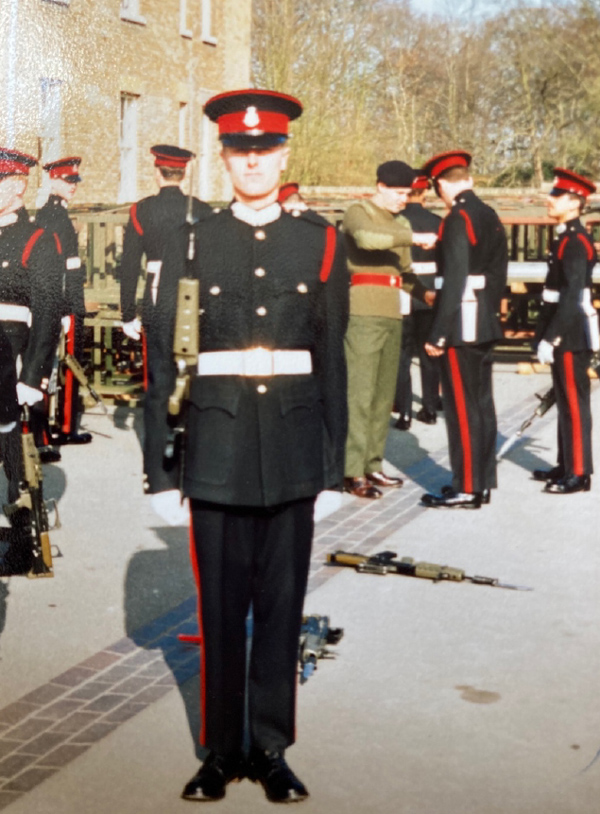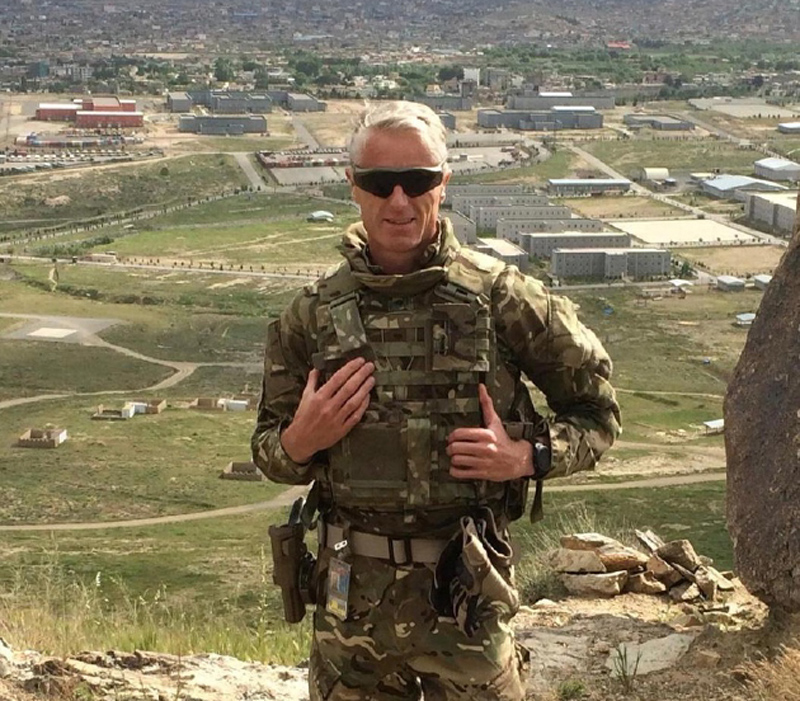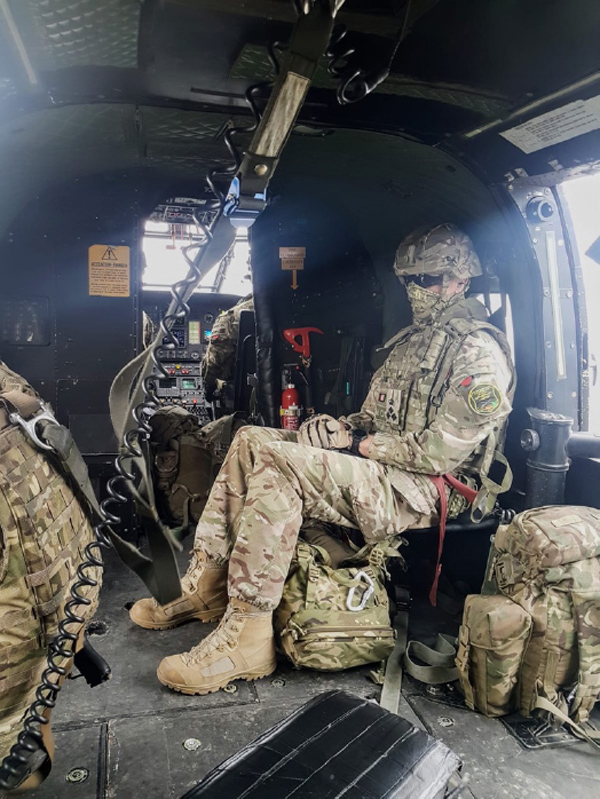Jonathan Timmis, the new chief operating officer at Astrea Academy Trust, has worked from bombed-out buildings to the White House. Jess Staufenberg met the former military adviser to NATO to find out why he has switched to helping run an academy trust
People switching careers to teach offer lots of reasons for doing so ̶ but this could be the first time someone has joined the profession in part because the Taliban undid everything they had worked for.
Brigadier Jonathan Timmis, a former senior Army officer, had been in Afghanistan for 13 months when he left last June as part of the evacuation of Western troops. By August, achievements of the previous 20 years had collapsed and now, Afghan girls are largely barred from going to school.
“The whole thing imploded, and if anything is going to give you pause to reflect, it’s probably that.”
Timmis has been in post as chief operating officer at the Astrea Academy Trust for less than a month. His role oversees HR, IT, finance and other trust infrastructure duties. He explains the move: “I feel I can serve my country, but in a different manner, and that’s investing in what’s utterly vital, which is education.”
The switch also allows the 52-year-old more time with his wife in north Yorkshire, their two sons and daughter, after years based everywhere from Northern Ireland, Cyprus, Iraq and, of course, Kabul.
It must have been an extraordinary CV to land on the desk of Rowena Hackwood, chief executive at Astrea. She says she was “at first surprised, and then quickly very impressed” and “eager to meet him”.
But the rise to a top military role, including with NATO, was not written in Timmis’ stars. From a non-military background, Timmis spent his childhood outdoors with three siblings and parents on a farm in Shropshire. He attended Lilleshall county primary school, Haberdashers’ Adams grammar school and the private Malvern College. Aged 18, he headed to Australia to surf and travel.
During this time he met his wife, whose father was in the army and who suggested he join too. Somewhat unsure, Timmis got a place at Sandhurst.
“From surfing to Sandhurst… it was a shock,” he smiles, in what seems the understatement of the century. In week one, he approached his platoon commander to say he was having doubts.
From surfing to Sandhurst… it was a shock
“He said to me, ‘Don’t worry, get through the first five weeks, and if you still feel the same you can leave.’ And I stayed 30 years.”
The extraordinary range and challenge of Timmis’ work becomes clear as he describes, in modest terms, those three decades.
At Sandhurst, he endured forced marches with heavy weights on his back, jumping over assault courses and simulated combat situations designed to test decision-making abilities. There was also “lots of marching around, which I never particularly enjoyed”, as well as lessons in history, international affairs and politics.

Next came a jungle warfare instructors’ course on the island of Brunei in south-east Asia, learning how to catch food, drink from vines, make a fire, find shelter and navigate in a jungle. “Which is a complete nightmare, I hasten to add,” he nods, eyes twinkling.
His first leadership role aged 23 was as troop commander in charge of 30 people. They went to Papua New Guinea, to retrace the footsteps of Australian troops during the second world war, along the Kokoda Track. It’s an “incredibly hard trek, even with 21st-century equipment”, says Timmis. “The respect I have for these old warriors is incredible.”
His first tase of the brutality of war came in the 1990s. His troops were deployed outside Sarajevo with the UN – acting as peacekeepers in the horrendous Bosnian war.
That leadership experience is one of the qualities he hopes to bring to Astrea. “When your team are frightened, or tired, you have to lead by example, and take people with you. Ultimately, in a position of leadership, you are responsible for everything.”
This approach was tested to its utmost during Timmis’ second tour in Iraq. One of his officers was “injured in a terrible accident – someone had accidentally shot someone else while cleaning weapons. Luckily he survived.”
Timmis was hauled up in front of his seniors, despite not being present at the scene. He told the officer: “Fundamentally, I’m in charge, so I’m responsible.”
The superior officer smiled, and allowed Timmis to stay in post. He found out later that a similar incident elsewhere had resulted in the Army leader being dismissed – because he blamed the officer, rather than take the blame himself.
Timmis soon climbed the ranks, eventually overseeing 50,000 troops and the related HR, logistics, engineering and finance. Although Astrea will be a much smaller operation, with 2,000 staff across 26 schools, Timmis said his “own experience maps well” on to the job description for the role.
His strategy skills were especially honed in a very senior role: as military assistant to the Supreme Allied Commander of NATO for Europe, from 2009 to 2011 (he worked for NATO again from 2018 to 2020).
He advised James Stavridis, a now retired US Navy admiral who almost became Hilary Clinton’s presidential running mate. Timmis travelled to the White House, Number 10, and political summits across the world.

“When you see all the prime ministers or presidents of a country surrounded by their huge entourages, it was just remarkable to see so much influence in one room,” he says thoughtfully.
He especially remembers one journey: they were flying over the English Channel in a black ops helicopter during bad weather conditions for a meeting in Number 10, when the helicopter blades started to freeze up.
“We thought we might have to land in the channel. Thankfully, we didn’t!” (Honestly, if you had to be in a helicopter and the blades were jamming, it would be with this man. He is calm without being cold.)
There is also the difficult question of how people in the forces come to terms with being expected to shoot somebody. Perhaps for some parents in schools, it is question they will wonder about.
“The level of training you get in the Army about the terms of the rules of engagement, weapons handling, understanding the situation, is absolutely superb,” responds Timmis. “It’s a last resort thing.”

It also strikes me that, given the political state of the world, increased profile of NATO and polarising opinions on social media, the academy trust has someone with an unusual and extraordinary expertise about international affairs in their midst.
I ask Timmis whether political education should be taken much more seriously in the UK (as it is in countries with turbulent recent political histories, such as Germany)?
“It’s a really fascinating point. Something I’ve learned over the years is it’s about the importance of anthropology,” replies Timmis. “It’s the importance of trying to understand something from the other person’s perspective.
“When you are trying to learn about politics and people, you need to invest in their culture, history, demography and geography. Otherwise there’s a danger you can become institutionally arrogant.”
It seems at odds with politicians’ clamour for schools to focus on British history in the curriculum.
The other thing that emanates from Timmis is his character – careful, measured, unflappable, but evidently with strong values (he calls the Taliban’s restrictions on women “like a nation committing self-harm”).
His character is likely in part developed from being physically tested. Yet again, physical fitness is not taken deeply seriously in most English schools.
“If you push the body, you can push the mind. That’s one of my key tenets,” nods Timmis.
“When I’ve walked around a few schools here, I’ve been really impressed with the sports facilities, but it’s something we can definitely do more of. That’s something I would love to get involved in.”
If you push the body, you can push the mind
A major plus is that the people in teaching have blown him away.
He admits he was worried he might be seen as “some institutionalised person”. But he says the teachers couldn’t be friendlier, and although he’s not on any teacher training programme at present, he may consider it.
The government has long tried to get more service leavers into schools through ‘Troops to Teachers’ and ‘Further Forces’ programmes, assuming they will bring natural discipline with them.
But meeting Timmis, roles in operations and logistics seem a very good fit, too. And even more than that, it’s perhaps his international knowledge, and his expertise in real physical training, that schools should really be mainstreaming.














Your thoughts